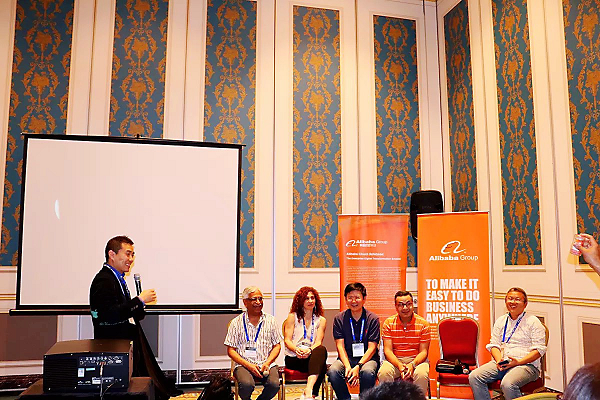On April 9, Alibaba Cloud held a workshop on the theme "Database in the Cloud Era" at ICDE 2019. This workshop ran from 16:00 to 17:30 Macau local time.
Dr. Feifei Li (nickname: Feidao), Alibaba Vice President and Distinguished Engineer and Head of Alibaba Cloud Database Business Group, chaired the workshop. Five well-known scholars and professors participated in the panel discussion, and held in-depth discussions with the nearly 100 attendees.
The five professors were:
Anastasia Ailamaki, Professor and ACM Fellow, EPFL;
Ihab Ilyas, Professor and ACM Distinguished Scientist, Vice Chair of ACM SIGMOD, University of Waterloo;
Guoliang Li, Professor, Tsinghua University;
C Mohan, IBM, IEEE and ACM Fellow, IBM;
Xiaofang Zhou, Professor and IEEE Fellow, University of Queensland;

The workshop was divided into two parts. In the first part of the workshop, several technical experts from Alibaba Group and Database Business Group of Alibaba Cloud Intelligence, including Manyi Lv, Liang Lin, Gui Huang, and Honglin Qiao, introduced the progress on Alibaba's POLARDB for MySQL, POLARDB X, AnalyticDB, SDDP(Self-Driving Database Platform), and other products. They talked about how they rely on innovation to help enterprises solve the data processing difficulties faced by traditional database business scenarios. Given its world-leading technology in intelligent databases and renowned brand and culture, Alibaba Cloud ranks among the top three database brands in the global cloud data market.
In the second part of the workshop, several professors gave their own opinions on the database trends and challenges in the cloud era. Then, the participating scholars discussed the issues that concern them in depth.
Professor C Mohan pointed out that, in the cloud era, serverless architecture allows users to implement applications without considering hardware and software configurations and implement automatic scaling through PaaS. For databases, robustness is a basic requirement, while it is also necessary to enhance the distributed load processing capability. Such architectures currently face certain challenges. For example, users of a public cloud are in a private environment, hybrid clouds require excellent distributed OLTP DBMS, and the memory/storage architecture still requires a lot of work. In addition, data security and data management are both issues that need to be considered.
Professor Anastasia Ailamaki pointed out that, data diversity (relational data and non-relational data) is a huge challenge for data processing in databases. Users need to create an intelligent database to handle various loads and expand the SQL interface. Code-Generation provides an access path for the underlying data during runtime. In addition, data cleaning consumes a great deal of resources, including tools that migrate data from traditional databases to cloud databases (users can ignore the migration details). Nothing would please users more than if cloud databases could seamlessly address these two issues.
Professor Xiaofang Zhou believes that migration from traditional to cloud databases is a system project. To improve user experience, cloud databases strive to solve problems such as high concurrency and scalability. Migration from traditional to cloud databases is not only a migration, but also a self-optimization process, during which you can build an ecosystem and conduct in-depth research in different fields.
Professor Ihab Ilyas shared his insights and achievements in data cleaning and cloud integration. He pointed out that the problem of migration to cloud databases is not in the cloud itself, but the fact that users generally choose products that they are familiar with. Cloud databases must understand customer needs and solve customer problems. "Algorithm implementation is not a nightmare for big data engineers, but the Hadoop version has become a nightmare," he said. "We find that migration is already happening, but we need to pay more attention to the process itself and be sensitive to it so we can give users a painless migration experience."
Professor Guoliang Li believes that the most important feature of cloud databases is that database maintenance is not necessary, which reduces DBA costs. However, a database is more complex than an operating system. To migrate a database, you must migrate the database ecosystem and construct the necessary apps. The business applications of small companies are easy to migrate to the cloud. However, the process for large companies is more difficult because their businesses are too complex. Therefore, cloud vendors need to solve the application migration problems faced by large companies.
Finally, experts and scholars in the database field stressed that we can learn from the evolution and development of the cloud and big data ecosystems and gradually bring database technology into the machine learning field, rather than blindly trying to create an "all-powerful" database. The professors also said that they looked forward to Alibaba's continued contributions to this field.
ApsaraDB - April 3, 2019
Alibaba Clouder - July 12, 2019
Alibaba Clouder - September 8, 2020
Alibaba Container Service - July 19, 2019
Alibaba Clouder - October 26, 2020
ApsaraDB - May 23, 2024
 PolarDB for PostgreSQL
PolarDB for PostgreSQL
Alibaba Cloud PolarDB for PostgreSQL is an in-house relational database service 100% compatible with PostgreSQL and highly compatible with the Oracle syntax.
Learn More PolarDB for Xscale
PolarDB for Xscale
Alibaba Cloud PolarDB for Xscale (PolarDB-X) is a cloud-native high-performance distributed database service independently developed by Alibaba Cloud.
Learn More PolarDB for MySQL
PolarDB for MySQL
Alibaba Cloud PolarDB for MySQL is a cloud-native relational database service 100% compatible with MySQL.
Learn More AnalyticDB for MySQL
AnalyticDB for MySQL
AnalyticDB for MySQL is a real-time data warehousing service that can process petabytes of data with high concurrency and low latency.
Learn MoreMore Posts by ApsaraDB